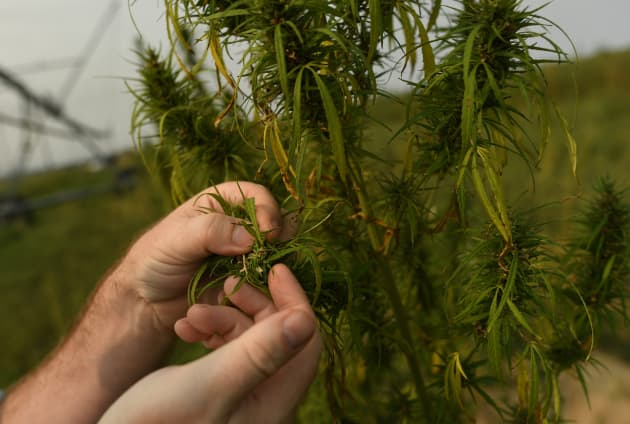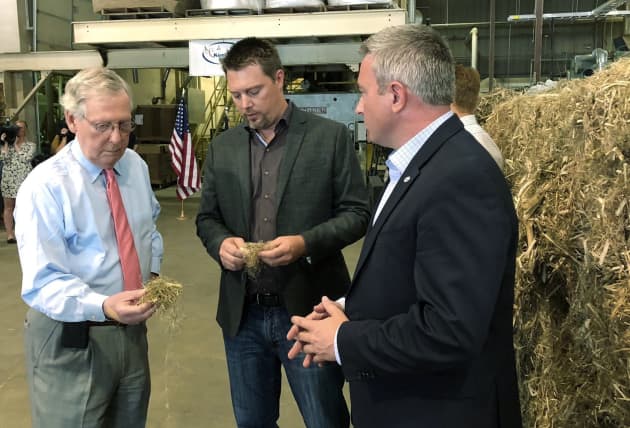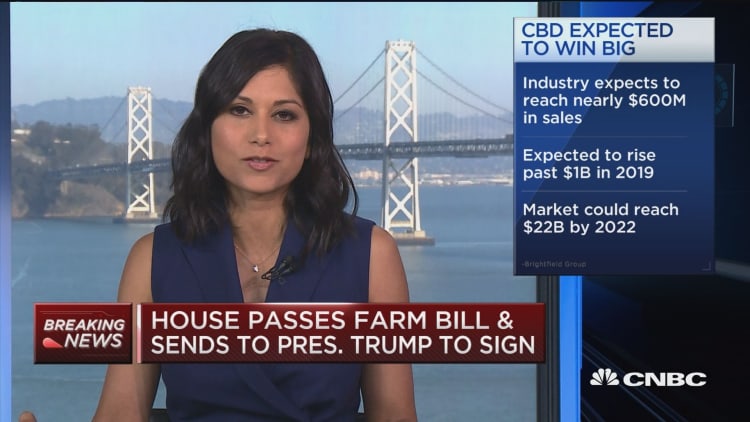Source: cnbc.com
KEY POINTS
- A provision in the 2018 Farm Bill makes hemp, marijuana’s no-buzz cousin, no longer a federally illegal substance.
- It allows farmers and other cultivators to grow the leafy, lanky plant and sell its harvest to processors so they can make hemp-based products ranging from foods, beverages and cosmetics to paper, clothing and building materials.
- Twenty-four states have hemp farming.
- CareerBuilder, Indeed, ZipRecruiter and other mainstream job websites list hemp openings.

Damian Farris, co-owner of Colorado Cultivars Hemp Farm, looks at the crop before it is harvested on September 5, 2017 in Eaton, Colorado.
RJ Sangosti | Denver Post | Getty Images
It won’t get you high, but lots of people are high on hemp. Thanks to the passage of the 2018 Farm Bill last December, hemp — marijuana’s no-buzz cousin — is no longer a federally illegal controlled substance. A provision in the bill allows farmers and other cultivators to grow the leafy, lanky plant, cannabis sativa L, and sell its harvest to processors, who in turn extract and market raw materials to producers of hemp-based products, everything from foods, beverages and cosmetics to paper, clothing and building materials.
Another by-product of legal hemp will be tens of thousands of new jobs across multiple sectors in the very near future. Besides hiring workers in agriculture, processing and manufacturing, the still-budding industry — with $1.1 billion in revenues 2018, estimated to more than double by 2022 to $2.6 billion, according to New Frontier Data — will need accountants, lawyers, compliance officers, government regulators, IT specialists, financial and insurance experts, transporters, researchers and lab technicians, marketers, CFOs, CEOs and various retail employees.
Some of those workers will be hired by existing companies, such as banks, truckers, farm equipment makers and drugstore chains, while others will employed by opportunistic start-ups.
“Job creation is going to happen in every economic bracket,” said Erica McBride Stark, executive director of the DC-based National Hemp Association. She had just returned from the 6th annual NoCo Hemp Expo in Denver, twice the size of last year’s, drawing more than 225 exhibitors and 10,000 attendees. “The hemp industry will create high-skilled management jobs, labor-type jobs and everything in between,” Stark said. “It’s going to touch all of society.”
WATCH NOW
The foundations are in place for tremendous job growth in the coming months. Indeed reported a spike in hemp-related job openings early this year, and HempStaff has seen its hemp jobs double from a year ago, now representing 16% of its recruiting business. Still, it will take at least a year to gather hard data from government and independent sources. “I expect job growth will more dramatically move in the second half of this year as more processors come online and as we approach harvest of hemp plants,” Stark said.
The marijuana economy
Of course, there’s already a separate and thriving industry for legal marijuana, to date approved for medicinal use in 34 states and recreational adult use in 10 states and D.C. Retail sales at regulated marijuana dispensaries reached around $9 billion last year, according to Marijuana Business Daily. Note, though, that pot remains a federally illegal Schedule I controlled substance, so factor in the nebulous black market and that sales figure may be as high as $52.5 billion.
It should be noted, too, that despite hemp’s new federal status, the Farm Bill stipulates that individual states can choose to establish their own agriculture and commerce programs, or not. As of February, 41 states allowed cultivation of hemp for commercial, research or pilot programs, although only 24 states had farmers actually growing hemp last year. Total hemp acreage in the U.S. was at 78,176 acres, up from 25,713 in 2017, the advocacy group Vote Hemp estimates, and the acreage should be considerably higher in the coming years.

In this July 5, 2018 photo, Senate Majority Leader Mitch McConnell inspects a piece of hemp taken from a bale of hemp at a processing plant in Louisville, Ky. McConnell led the push in Congress to legalize hemp.
AP Photo | Bruce Schreiner
Ever since the Farm Bill passed, we have seen a huge increase in hemp clients coming forward, saying they need staff now or in the next few months.
James Yagielo
CEO OF HEMPSTAFF
In January, Canopy was granted a license by New York State to process and produce hemp, the first step in the company’s plan to invest $100 million–$150 million in the state’s economically distressed Southern Tier region.
“Wow, do they need work,” remarked Bruce Linton, co-CEO and chairman of Canopy, adding that 200 people will initially be hired primarily in farming and processing. Hemp is going to create jobs where they’re needed, he opined, because growing, processing and making hemp products will be more cost-effective in depressed areas versus cities with higher real estate prices and labor costs.
That strategy was likely on the mind of Republican Sen. Mitch McConnell of Kentucky as he championed the Farm Bill’s hemp legalization provision, seen as a job-creating boon among the Bluegrass State’s dwindling tobacco farmers and coal workers. A major producer before hemp was outlawed in 1937, Kentucky has been cultivating hemp under a pilot program in the 2014 Farm Bill.
This year its department of agriculture approved more than 42,000 acres for hemp, based on applications from 1,035 farmers and 130 processors, with expectations that 20,000 acres will ultimately be planted this spring and summer for fall harvest. That compares to 6,700 planted acres in 2018, comprising 210 farmers and 72 processors. “It’s not uncommon to see a lot of former tobacco farmers looking at industrial hemp as an opportunity,” said Ryan Quarles, the department’s commissioner.
One of them is Joe Sisk, 45, who last planted tobacco on his farm near Hopkinsville, Kentucky, in 1998 and is now dedicating about 40 acres to hemp, alongside traditional crops. “Hemp is here to stay,” he said, adding that he hears talk of other tobacco farmers switching to hemp. “This is not some fad. Kentucky will have a very substantial hemp industry.”
For more on tech, transformation and the future of work, join CNBC at @ Work: Human Capital + Finance Summit in Chicago on July 19.

ReplyDeleteGelato
CBD capsules
THE BEST VAPORIZERS